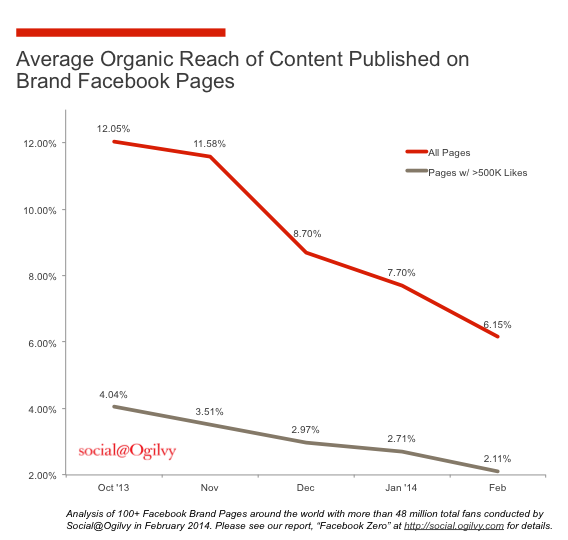If you have any exposure to social media metrics for your company or clients, particularly Facebook metrics, the results of a recent social@Ogilvy study aren’t going to shock you—the average reach of organic posts declined from 12.05 percent in October to 6.15 percent in February.
In fact, you’re hopefully one step ahead, asking important questions.
- How do we begin transitioning away from “expecting” organic reach, and begin planning for social media to become a larger part of online efforts to reach key audiences through paid content?
- How does that affect our social objectives?
I briefly mentioned this thought to several clients toward the end of last year. The apparent shift in Facebook’s algorithm was leading to declines in organic reach for previously high-ranking content types, so we began to experiment with a mix of promoted and organic content. We reviewed our overall objectives to ensure that, despite the “underperforming” nature of one platform, we’re still meeting our overall objectives.
But it’s now going to become a larger discussion point, because let’s “face”-book it, many companies have been hooked. Companies focused very hard, and spent a lot of ad dollars, over the last several years gaining those Facebook fans, and now the price is effectively going up to really engage with those fans. Ogilvy’s Marshall Manson puts some perspective to it in noting that “increasingly Facebook is saying that you should assume a day will come when the organic reach is zero.”
We’ve always tried to counsel clients on the strategic nature of social interaction with their audiences, as opposed to simply going hard into one platform or another. Again, Ogilvy’s Manson shared a similar thought: “I think we need to return to platform-neutral social strategies.”
How are you approaching the social space? What’s your long-term strategic plan? If you don’t have convincing answers to these questions, then news like this will always be unsettling.









